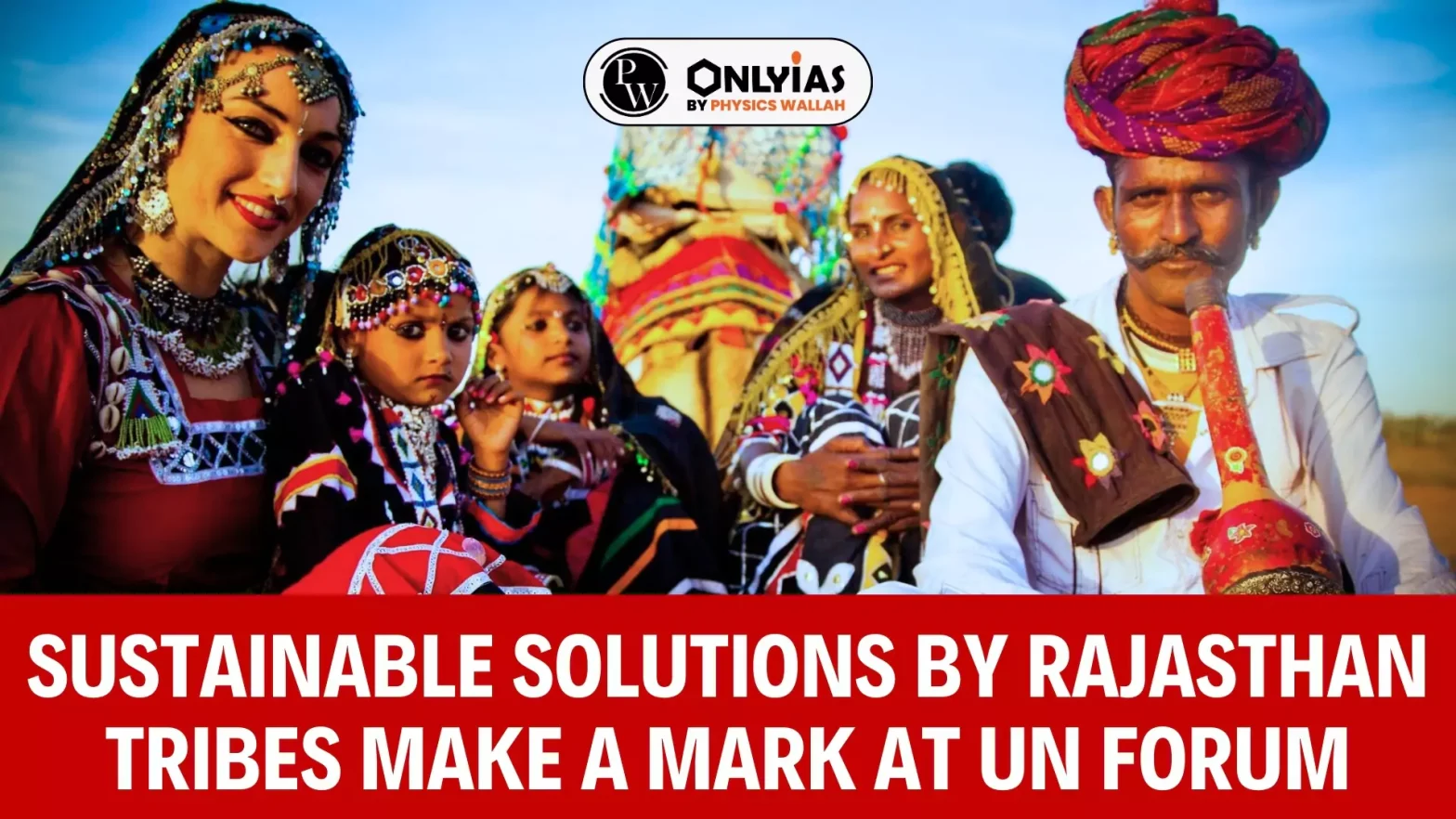Recently, the UN High-Level Political Forum (HLPF) on Sustainable Development in New York was organized.
Key Highlights of the High-Level Political Forum (HLPF) on Sustainable Development
-
Focus on Indigenous Solutions
- Indigenous Contributions: The forum highlighted how indigenous communities in Rajasthan, India, provide valuable solutions for global challenges like climate change.
- Global Engagement: Experts highlighted the need to involve indigenous communities in creating sustainable development strategies.
- Traditional Practices: A representative from Rajasthan shared how tribal traditions help protect the environment and promote sustainability.
Enroll now for UPSC Online Course
High Level Political Forum
- HLPF is a major body for overseeing and guiding UN policies related to sustainable development.
- Establishment: It was formed in 2013.
- Objective: it aims to review progress on the 2030 agenda for sustainable development.
|
-
Call to Action for Sustainable Development Goals (SDGs)
- Forum Theme: The theme was “Reinforcing the 2030 Agenda and eradicating poverty in times of multiple crises.”
- Ministerial Declaration: A call for renewed efforts to achieve the SDGs, which focus on tackling poverty, inequality, and environmental issues.
- Commitment to Inclusivity: The UN emphasized the need to ensure that no one is left behind in the implementation of SDGs.
- Examples of Successful Practices
- Seed Preservation: Tribes in Rajasthan have maintained indigenous seed varieties, enhancing biodiversity and climate resilience.
- Agricultural Techniques: Practices like mixed cropping and using uncultivated foods improve food security and self-sufficiency.
- Community Empowerment: These methods help communities remain resilient during tough times.
- Water Conservation: Techniques to conserve water at the source.
-
Overall Message
- Indigenous Knowledge: The forum showcased the potential of indigenous practices to address global issues and support the achievement of SDGs.
- Need for Collaboration: Greater collaboration and recognition of indigenous communities are essential for a sustainable future.
What Are Indigenous Practices?
- Indigenous practices involve knowledge, skills, and techniques that have been handed down through generations within a specific community or culture.
- Cultural Connection: These practices are deeply connected to the local environment and resources.
Impacts and Benefits
- Crisis Response: Indigenous practices help address global crises like climate change, economic inequality, and environmental degradation.
- Sustainable Solutions: Tribal methods based on principles of sovereignty contribute to self-sufficiency, better agricultural practices, and enhanced food and livelihood security.
- Empowerment: Initiatives on seed sovereignty, soil sovereignty, and water conservation have empowered tribal communities to tackle critical challenges collectively.
- Gender Equality and Human Rights : When aligned with human rights, indigenous cultural practices and values can promote gender equality and respect for human rights.
Check Out UPSC CSE Books From PW Store
Status of Tribal Communities in India
Demographic Status
- Population Share: Tribal communities make up about 8.9% of India’s population.
- Particularly Vulnerable Groups: Approximately 2.6 million (2.5%) are part of “Particularly Vulnerable Tribal Groups” (PVTGs), also known as Primitive Tribes, who are the most disadvantaged among Scheduled Tribes.
- Geographical Distribution: Tribes are spread across various states, with significant populations in Madhya Pradesh, Maharashtra, Odisha, Chhattisgarh, Rajasthan, the Northeast Region (NER), and the Andaman & Nicobar Islands.
Cultural Status
- Rich Heritage: Tribal communities have unique cultures, languages, and traditions.
- Connection to Nature: They rely on forests and hills for their livelihood and maintain a close relationship with nature.
- Distinct Practices: They have their own beliefs and practices related to health, education, religion, and governance.
Constitutional and Statutory Provisions
- Recognition: Some tribal communities are recognized as Scheduled Tribes (STs) under Article 342 of the Indian Constitution.
- Special Provisions: They receive special protections and provisions for their social, economic, educational, and political development.
- Legal Safeguards: Their rights are protected by laws like the 5th and 6th Scheduled Areas, the Forest Rights Act 2006, and the Panchayats (Extension to Scheduled Areas) Act (PESA) 1996.
- Political Representation: They have reserved seats in Parliament and State Legislatures.
- Historical Achievement: Draupadi Murmu is India’s first tribal President.
Developmental Status
- Challenges: Tribal communities face significant challenges including poverty, illiteracy, malnutrition, poor health, and limited employment opportunities.
- Development Gaps: They lag behind the national average in areas like income, education, health, sanitation, and gender equality.
- Discrimination and Exploitation: They often face discrimination, exploitation, displacement, and violence, with limited access to resources and opportunities for empowerment.
|
![]() 23 Jul 2024
23 Jul 2024
